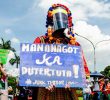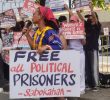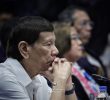DAVAO CITY – The Army is the one to blame for arming tribal militias, one of whom killed a businessman and his wife in Kapalong, Davao del Norte, a tribal organization said.
“The Army trained and armed these militia men which, according to them, will help keep the peace and fight communist rebels, but now civilians became their victims,” said Lito Sampag.
Sampag, spokesperson of Kapalong Manobo IP (indigenous people) organization Karadyawan, said the killing of Reynaldo Labra Martir, 50, and his wife Teresita, 48, last Black Saturday in Sitio Patel, Barangay Gupitan,was only one of the recent killings perpetrated by the militia whom they call as Alamara (Manobo term for widespread indigenous warfare).
“Last March 26, another Alamara killed Sangkok Acero, 43, and his son Dayan, 22, in Sitio Maguimon because of a personal grudge but it was not reported,” said Sampag.
Davao Today is yet to verify the death of the Aceros with the Kapalong police.
Sampag said “these Alamara are also our kin, we know them not to be braggarts and proud people (mga isog) but because they are now armed, they changed.”
The suspect, earlier identified in reports as Panggong Masaloon is also known as Panggong Bucad, said Sampag, wants to get ahead of others who are in line in a corn mill owned by the Martirs.
“He (Bucad) said he wants to go first because his family is already hungry because the government’s issue of three kilos of rice for his family ran out,” said Sampag.
First Lieutenant Vergel Lacambra, spokesperson of the Army’s 10th Infantry Division, in an interview said Masaloon is now in police custody.
Lacambra said Bucad is a member of the Army’s Citizens Armed Force Geographical Unit (Cafgu), the Army’s local augmentation force recruited from the IP community.
Lacambra said the Army do not “tolerate” such acts by any member of the Cafgu and that “it was the Army detachment officer (of Bucad’s Cafgu unit) that brought him to the police.”
However, Lacambra said the Army detachment officer, from the Army’s 60th Infantry Battalion, cannot be held “accountable, as the crime committed was personal.”
Lacambra said that if it were an Army operation and civilians get killed, it might have been a different scenario.
Sampag said “it doesn’t matter whether it’s a personal grudge or whatever case as they were the ones responsible for the Cafgus as they trained and armed them.”
Karadyawan is the group who raised the alarm August of last year of a build-up of government troops in their communities.
In December, Karadyawan also expressed fears of the revival of the Alamara who they say were responsible of killing civilians a decade ago.
While the Army and the local government say that the Army and the Cafgu is out to conduct insurgency operations in the area, Karadyawan said “it will only result to the harming of civilians.”
“On our own, we were able to survive even a great storm Typhoon Pablo (Bopha) without the help of the government. We were even able to seek help to put-up water and irrigation system, a corn mill and a school,” said Datu Mintroso Malibato, Karadyawan chairperson.
Malibato said “we want to go back to that situation where the Army, the Alamara are not in our communities so we can farm in peace.”
Karadyawan also accuse the Army of harassing their IP schools, barring its teachers from entering their communities and occupying it and other buildings for its insurgency operations.
In January, Davao City Mayor and Regional XI Peace and Order Council Chair Rodrigo Duterte went to the area to conduct a dialogue with Karadyawan, thr school teachers, the Army, the Cafgus and local government officials.
The groups agreed that school teachers must be allowed to enter and finish the school year but the schools operation is to be renegotiated.
The talks failed to come-up with a more lasting solution on Karadyawan’s complaints. (davaotoday.com)










